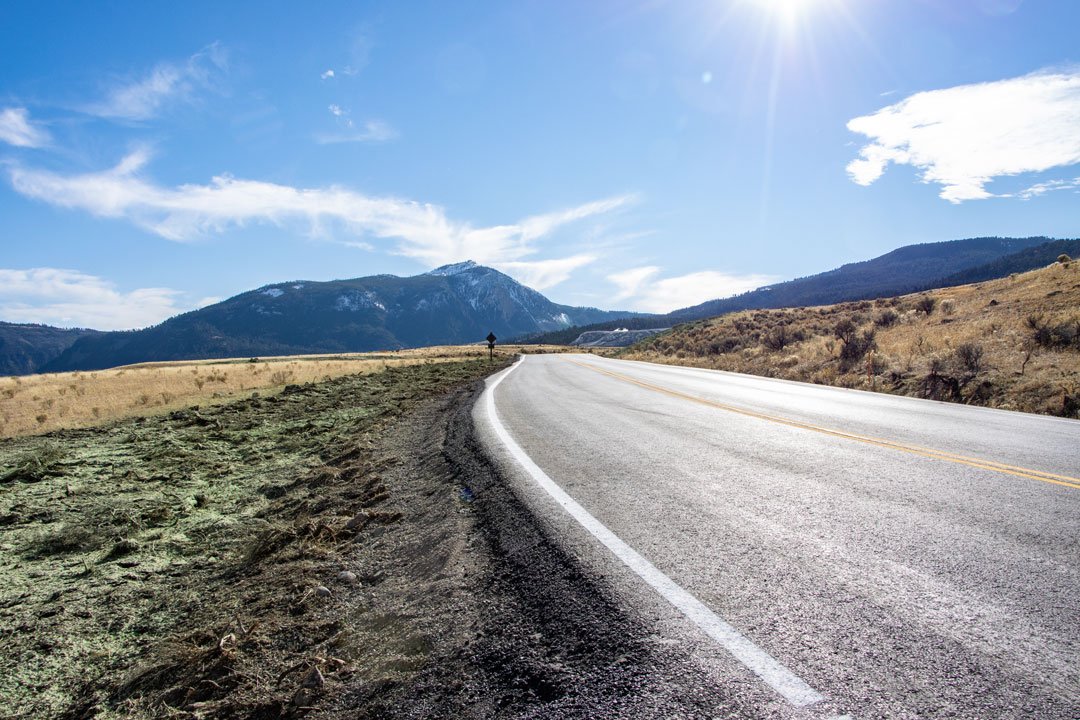By Emma Heller
Each November in Yellowstone National Park a majority of the roads close to conventional vehicles for the winter. This year has been anything but normal for traveling in Yellowstone due to the historic flooding in June 2022. The flooding primarily affected roads in the North and North Eastern regions of the Park, which remained closed from the damage until recently. Ironically, the two main sections of damaged roads, from the North Entrance in Gardiner, Montana to Mammoth Hot Springs and Lamar Valley to the North East Entrance in Cooke City, Montana are part of the roadways that are typically open year-round while the remainder of Park roads close from November through April.
On your way to Cooke City, MT, this is just one of many sections of road that was damaged from Soda Butte Creek flooding.
That was not the case this year! Due to the damage to the roads from the flooding, these two sections have been under construction and recently opened, just in time for the other roads in the Park to close which occurred on November 1st.
This picnic table traveled downstream hundreds of yards from a picnic area that was located next to Soda Butte Creek.
On October 15th, we received exciting news that the road into Lamar Valley and out to Cooke City would open. Lamar Valley has an abundant wildlife population, similar to that of Hayden Valley. Black bears, grizzly bears, bison, elk and wolves are just some of the animals that make Lamar Valley their home. On the way to Cooke City there is the chance to see moose. Make sure to stop at Barronette Peak with your spotting scope to look for mountain goats! Just outside of the Park, the road continues either to the majestic Beartooth Mountains or the beautiful Chief Joseph Pass. With winter around the corner, many will take this route to snowmobile and backcountry ski in Cooke City. To say the least, we are excited to have access to this amazing part of the Park again.
The iconic Lamar Valley.
We are also thrilled to have access Mammoth Hot Springs from the North Entrance! During the flooding, the Gardner River destroyed the route between Gardiner and Mammoth beyond repair. Mammoth is the park headquarters and many employees live in Gardiner. Fortunately, the stagecoach route from the 1880s which has been used as a scenic, one-way dirt road linked Mammoth to Gardiner. This route allowed travel for employees and tour companies and over the summer has been constructed into the new and improved route. After paving the dirt road, widening it for two-way travel, adding pull-outs and guard rails, it opened October 30th. The new route does have a steep grade and hairpin turns making for an exciting drive with beautiful views.
The new road connecting Gardiner, MT to Mammoth Hot Springs has many sharp turns and a steep grade.
As you crest the top of the new road, you get views of the Mammoth Terraces and Bunsen Peak.
Entrance towns like Cooke City and Gardiner have taken a huge economic hit this summer and we applaud the Park Service with their efforts to open these roads. If you are planning a trip to the area this winter, consider exploring Gardiner and Cooke City. Many of Lamar Valley’s animals can be seen in the winter, except hibernating bears. The Park roads that closed November 1st, will re-open mid-December for snowmobile and snow cat travel. Exploring Yellowstone in the winter is an incredible experience that most don’t take advantage of.
If you do visit the park this winter, it is a good idea to stay up-to-date on road conditions and closures. To do so, you can visit https://go.nps.gov/yellroads, sign up for road alerts on your phone by texting “82190” to 888-777 or call (307) 344-2117 for a recorded message.






